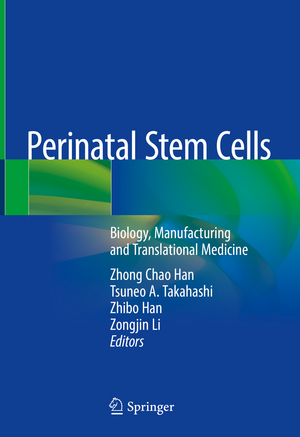Perinatal Stem Cells: Biology, Manufacturing and Translational Medicine
Editat de Zhong Chao Han, Tsuneo A. Takahashi, Zhibo Han, Zongjin Lien Limba Engleză Hardback – 25 mar 2019
Currently, the limitations of postnatal cell sources and expanding efficiency may limit autologous stem cell therapies. Although embryonic stem cells (ESCs) and induced pluripotent stem cells (iPSCs) can be cultured indefinitely ex vivo, and can differentiate into three germ layers, ethical issues, the teratoma formation of ESCs and oncogenic risk of iPSCs are major obstacles to their clinical application. More recently, perinatal stem cells have been isolated from the umbilical cord, Wharton’s Jelly, placenta, amniotic membrane and amniotic fluid, which are normally discarded as medical waste. This book, after describing perinatal stem cells in detail, introduces readers to the various types of perinatal stem cells, addressing their characterization, banking, quality control and stability. Importantly, it also reviews the clinical applications of perinatal stem cells to therapy of diseases. Accordingly, it offers a valuable resource for clinicians, researchers and graduate students alike.
Preț: 722.69 lei
Preț vechi: 760.73 lei
-5% Nou
Puncte Express: 1084
Preț estimativ în valută:
138.30€ • 150.18$ • 116.17£
138.30€ • 150.18$ • 116.17£
Carte disponibilă
Livrare economică 01-15 aprilie
Preluare comenzi: 021 569.72.76
Specificații
ISBN-13: 9789811327025
ISBN-10: 9811327025
Pagini: 186
Ilustrații: VI, 173 p. 10 illus., 8 illus. in color.
Dimensiuni: 178 x 254 mm
Greutate: 0.59 kg
Ediția:1st ed. 2019
Editura: Springer Nature Singapore
Colecția Springer
Locul publicării:Singapore, Singapore
ISBN-10: 9811327025
Pagini: 186
Ilustrații: VI, 173 p. 10 illus., 8 illus. in color.
Dimensiuni: 178 x 254 mm
Greutate: 0.59 kg
Ediția:1st ed. 2019
Editura: Springer Nature Singapore
Colecția Springer
Locul publicării:Singapore, Singapore
Cuprins
Chapter 1. Introduction of perinatal tissue-derived stem cells.- Chapter 2. The regenerative and reparative potential of amniotic membrane stem cells.- Chapter 3. The stemness of perinatal stem cells.- Chapter 4. Quality Assessment of Umbilical Cord Tissue in Newborn Stem Cell.- Chapter 5. Safety and Genetic Stability of Cultured Perinatal Mesenchymal Stem Cells.- Chapter 6. Therapeutic application of perinatal mesenchymal stem cells in nervous system diseases.- Chapter 7. Umbilical cord blood as a source of novel reagents and therapeutics.- Chapter8. The characteristics and therapeutic application of perinatal mesenchymal stem cells derived exosomes.- Chapter 9. Therapeutic application of perinatal mesenchymal stem cells in diabetes mellitus.- Chapter 10. Perspective of therapeutic angiogenesis using Circulating Endothelial Progenitors from umbilical cord blood.- Chapter 11. Proangiogenic Features of Perinatal Tissue Derived Stem Cells in Cardiovascular Disease Therapy.- Chapter 12. Perinatal Stem Cells in Kidney Regeneration: Current Knowledge and Perspectives.- Chapter 13. Prenatal mesenchymal stem cell secretome and its clinical implication.
Recenzii
“The book offers detailed insights into the sources of perinatal stem cells and how to derive, multiply and store them. It is intended for researchers in stem cell biology, tissue engineering, regenerative medicine, and students in developmental/stem cell biology. … perinatal tissue derived mesenchymal stem cells are expected to play an important role, along with massive vaccination campaigns, in restoring human health in the coming years.” (Manuela Monti, European Journal of Histochemistry, Vol. 65, 2021)
Notă biografică
Zhong Chao Han is a professor and director at the State Key Lab of Experimental Hematology, Institute of Hematology and Blood Diseases Hospital, Chinese Academy of Medical Sciences; Tsuneo A Takahashi is a visiting professor at the Institute for Frontier Medical Sciences, Kyoto University; Zhibo Han is an associate professor at the State Key Lab of Experimental Hematology, Institute of Hematology and Blood Diseases Hospital, Chinese Academy of Medical Sciences.
Textul de pe ultima copertă
This book provides a comprehensive introduction to various types of perinatal stem cells. Given their unique regenerative abilities, stem cells offer a promising avenue in the treatment of degenerative diseases or injury.
Currently, the limitations of postnatal cell sources and expanding efficiency may limit autologous stem cell therapies. Although embryonic stem cells (ESCs) and induced pluripotent stem cells (iPSCs) can be cultured indefinitely ex vivo, and can differentiate into three germ layers, ethical issues, the teratoma formation of ESCs and oncogenic risk of iPSCs are major obstacles to their clinical application. More recently, perinatal stem cells have been isolated from the umbilical cord, Wharton’s Jelly, placenta, amniotic membrane and amniotic fluid, which are normally discarded as medical waste. This book, after describing perinatal stem cells in detail, introduces readers to the various types of perinatal stem cells, addressing their characterization, banking, quality control and stability. Importantly, it also reviews the clinical applications of perinatal stem cells to therapy of diseases. Accordingly, it offers a valuable resource for clinicians, researchers and graduate students alike.
Currently, the limitations of postnatal cell sources and expanding efficiency may limit autologous stem cell therapies. Although embryonic stem cells (ESCs) and induced pluripotent stem cells (iPSCs) can be cultured indefinitely ex vivo, and can differentiate into three germ layers, ethical issues, the teratoma formation of ESCs and oncogenic risk of iPSCs are major obstacles to their clinical application. More recently, perinatal stem cells have been isolated from the umbilical cord, Wharton’s Jelly, placenta, amniotic membrane and amniotic fluid, which are normally discarded as medical waste. This book, after describing perinatal stem cells in detail, introduces readers to the various types of perinatal stem cells, addressing their characterization, banking, quality control and stability. Importantly, it also reviews the clinical applications of perinatal stem cells to therapy of diseases. Accordingly, it offers a valuable resource for clinicians, researchers and graduate students alike.
Caracteristici
Covers various types of the perinatal stem cells Provides comprehensive description of the biological foundation and manufacturing of the perinatal stem cells Introduces clinical applications of the perinatal stem cells in different diseases
